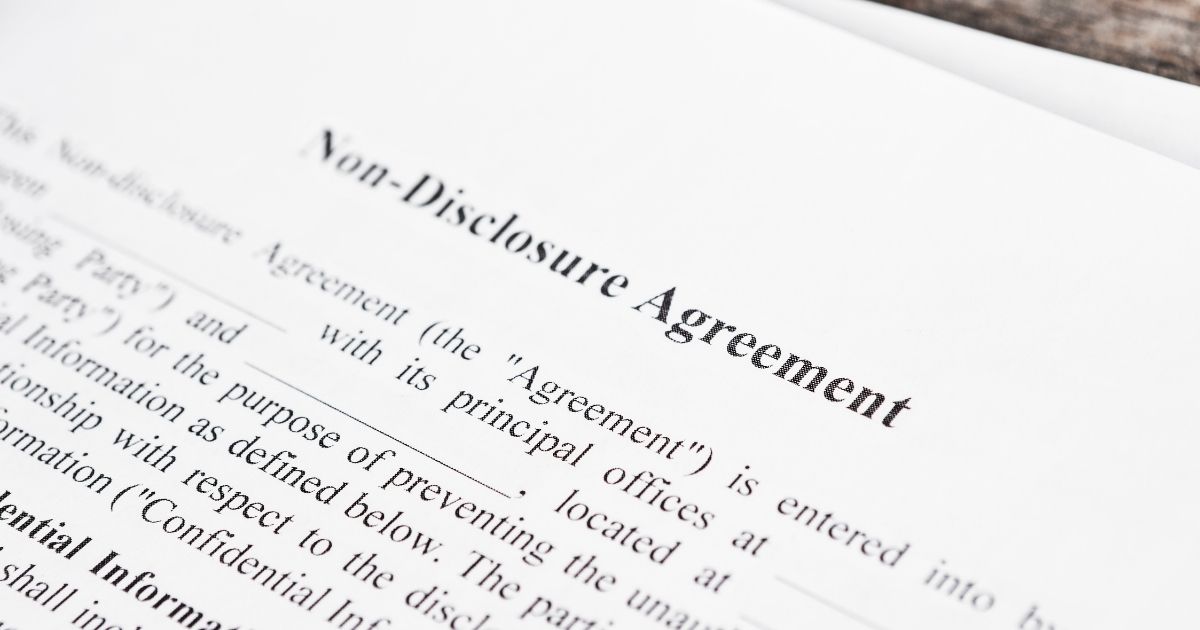How Do Non-Disclosure Agreements Work?

Non-disclosure agreements (NDAs) are legally binding confidentiality contracts regarding the sharing of sensitive business, financial, or proprietary information with others outside the agreement. NDAs are common when businesses negotiate with other businesses, firms, or individuals requiring confidentiality of the information and data shared among the parties during the process.
In business dealings non-disclosure agreements are common, especially when entering partnerships, hiring employees, or obtaining investors that require sharing sensitive information. An NDA provides confidentiality and security over the. Situations requiring an NDA may include:
- Mergers and acquisitions: When companies combine, purchase, or sell, sensitive financial and operational information must be shared among all parties involved, including brokers and intermediaries. Organizations choose to enter into NDAs in order to protect their information and ensure confidentiality.
- Products: NDAs are crucial when licensing or selling new products or technology to protect the spreading of proprietary, technical, and financial information outside the entities involved in the sale or licensing.
- Partnerships: When entering into new partnerships or securing investors, NDAs are essential to protect information shared during negotiations.
- Employees: It is also crucial for some organizations to require confidentiality among the employees regarding the sharing of sensitive data, financial or proprietary information, and business practices.
- Clients: An NDA protects organizations from the spread of sensitive information when acquiring new clients to prevent accidental exposure that could result in legal liabilities.
What Information Should Be Included in an NDA?
Though each NDA is unique based on an organization’s needs, there are essential elements typically included in confidentiality agreements, such as:
- Identification: Identify and detail the parties included in the agreement, which parties are disclosing and receiving, business partners, accountants, attorneys, and any others associated with the NDA, including names and contact information for all.
- Definitions: Detail what information is to be held confidential and protected by the NDA, and rules regarding the use of said information.
- Scope: One of the more crucial parts of an NDA, the scope clearly defines how the NDA will be enforced and specifically details on what information is protected under the agreement.
- Obligations: This section details what is expected of those who sign the contract and the consequences if the participants violate the agreement.
- Time limit: NDAs are generally not permanent and should specify the length of time participants are bound to uphold the terms of the agreement, as well as specify when that period will end.
- Information return: Depending on the scope of business and what information is covered under the NDA, some agreements include a section requiring the parties to confirm that the information they were privy to has been returned or destroyed.
- Remedies: This section details what actions will take place for breaches of the agreement. Typical consequences involve restraining orders, monetary fines, with additional actions for breaching fiduciary, copyright, patent, or trademark infringements.
- Exclusions: As with any business contract, there can be exclusions to NDAs as well, typically information that does not require confidentiality. These may include previously disclosed information, prior knowledge of business or financial information among the parties, or information that is public knowledge.
When entering an NDA, review if carefully and understand what is expected of you. Ask questions, voice concerns, and request clarifications if you uncomfortable or disagree with the terms. Never sign a contract that you do not agree with or fully understand.
Philadelphia Business Lawyers at Sidkoff, Pincus & Green P.C. Assist Clients Regarding Non-Disclosure Agreements
If your business is planning to merge or acquire another business, entering a partnership, or recruiting investors, you are likely going to need to develop non-disclosure agreements to protect your sensitive and proprietary information. Our experienced Philadelphia business lawyers at Sidkoff, Pincus & Green P.C. can assist in developing the agreement. Contact us online or call 215-574-0600 for an initial consultation. Located in Philadelphia, we also serve clients in New Jersey and Pennsylvania.













